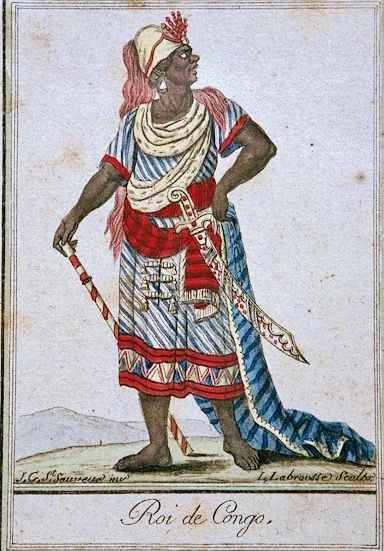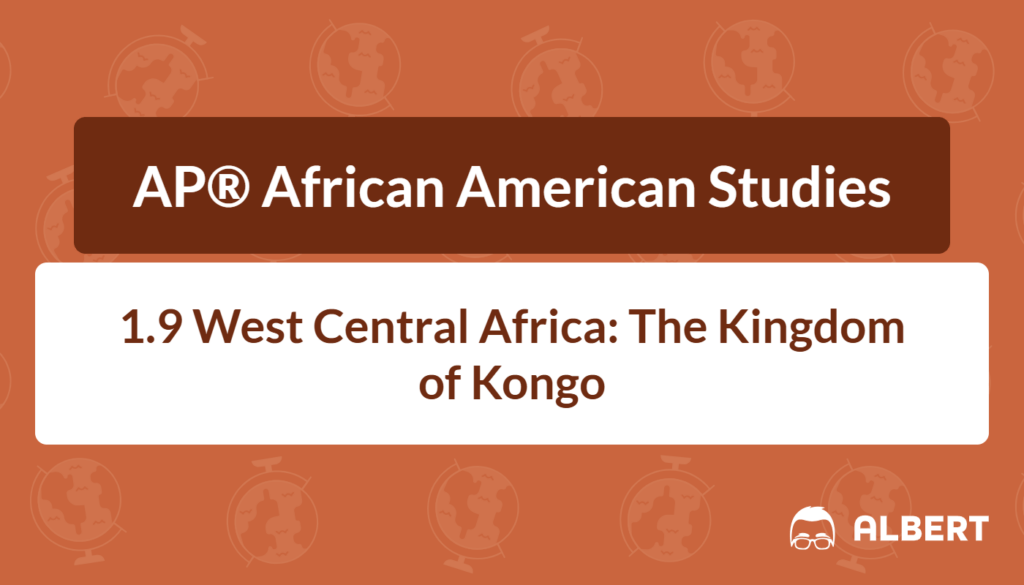What We Review
Introduction
The Kingdom of Kongo was a powerful state in West Central Africa. It played an essential role in regional trade and diplomacy, influencing societies not only in Africa but also across the Atlantic. Converts to Christianity, like King Nzinga a Nkuwu (João I) and his son Nzinga Mbemba (Afonso I), helped shape the kingdom’s economy and culture. Their decisions had lasting repercussions for the transatlantic slave trade and for the African diaspora in the Americas.
Many early African Americans traced their roots back to places like Kongo. Understanding Kongo’s political and religious history provides important context for AP® African American Studies students. Therefore, this post highlights the kingdom’s leadership, adoption of Christianity, and trade relations with Portugal. It also explores Kongo’s influence on cultural and naming traditions in early generations of African Americans.
The Kingdom of Kongo — An Overview
What Was the Kingdom of Kongo?
The Kingdom of Kongo existed in what is now Angola and parts of the surrounding regions. Its location was strategically advantageous, as it neighbored key river systems and trade routes. Because of this, the Kongo monarchy became wealthy and influential in West Central Africa.
Politically, the kingdom was ruled by a monarch known as the manikongo. The manikongo oversaw government administration and directed the kingdom’s diplomatic and commercial activities. Kongo’s political structure included provinces managed by governors who reported to the central authority. This arrangement allowed the kingdom to manage complex regional relationships and maintain a stable leadership system for many generations.
Key Figures in the Kingdom of Kongo
Important leaders included King Nzinga a Nkuwu (later baptized João I) and his son Nzinga Mbemba (later Afonso I). Both were central to the kingdom’s conversion to Christianity in 1491. Their support for Roman Catholicism transformed religious practices, inspiring a distinct African Catholicism that intertwined local traditions with Christian beliefs.
Nzinga’s royal court was instrumental in spreading Christianity. Because the nobility had major influence over everyday life, their participation encouraged thousands to adopt the new faith. Kongo’s rulers recognized that embracing Christianity offered significant benefits, including stronger political ties and expanded trading opportunities with Portugal.
The Adoption of Christianity
How Christianity Came to Kongo

By the late 15th century, Portuguese missionaries had begun traveling along Africa’s coasts. They shared Roman Catholic teachings and formed alliances with local rulers. In 1491, King Nzinga a Nkuwu embraced this partnership and voluntarily converted to Christianity, adopting the name João I in the process. His son Nzinga Mbemba also converted, taking the Christian name Afonso I.
Their conversion was not forced by a foreign occupation, which is significant for AP® African American Studies (LO 1.9.A). Instead, the kingdom welcomed Christian missionaries, believing this acceptance could strengthen diplomatic and economic ties. As a result, Christianity in Kongo mixed European religious themes with local, aesthetic traditions, creating a distinct form of African Catholicism.
Economic Impact of Christianity
The kingdom’s voluntary adoption of Christianity had immense economic consequences. Once allied with Portugal, Kongo gained access to broader European trade networks. Luxury items like ivory, salt, copper, and locally produced textiles became export staples (EK 1.9.A.2). Because Portugal needed raw materials and goods, Kongo merchants saw their influence grow.
Christianity also enabled new commercial relationships. Missionaries helped broker deals, while Portuguese traders felt more comfortable trading within a Christian-oriented kingdom. This openness to European markets brought Kongo substantial wealth and resources for improving governance, infrastructure, and the lives of its citizens.
Example: Economic Growth Through Trade
- Worship practices politically aligned Kongo with Portugal, prompting traders to visit the kingdom.
- Kongo expanded its exchange of ivory, salt, copper, and textiles in Lisbon’s markets.
- Kongo’s revenue rose, leading to internal growth, new projects, and a stronger monarchy.
Political Relations with Portugal
The Kingdom’s Engagement with Portugal
Religious conversion went hand in hand with political negotiations (LO 1.9.B). Kongo’s decision to adopt Catholicism helped secure military assistance and formal agreements with Portugal. In turn, the Portuguese monarchy expected loyalty and continuous commercial access, including the acquisition of enslaved labor (EK 1.9.B.1).
Therefore, the relationship extended beyond exchanging goods. Political alliances meant Kongo received Portuguese support in local conflicts. However, Portugal demanded captives in return for protection and military backing. This situation put Kongo’s rulers in a difficult position: they valued foreign aid, yet they also aimed to control how many captives were sent abroad.
Impact on the Transatlantic Slave Trade
Over time, Kongo nobles faced increasing pressure to provide captives to Portuguese merchants (EK 1.9.B.2). Although leaders like Nzinga Mbemba tried to limit the trade, they had little success. West Central Africa, including Kongo, eventually became the largest supplier of enslaved people to the Americas (EK 1.9.B.3).
It is important to recognize that the transatlantic slave trade did not begin as a fully developed system. It emerged gradually through a complex mix of local and foreign interests. African rulers initially negotiated the terms of trade, seeking to preserve autonomy and manage internal conflicts. However, as European demand for enslaved labor intensified, these dynamics shifted. The balance of power increasingly favored European merchants, and coercion, manipulation, and violence became more common. Kongo’s early engagement with Portugal reflected both diplomatic agency and growing vulnerability in the face of an expanding global system of exploitation.
Example: Kongo’s Role in the Slave Trade
- Conversion to Christianity bound Kongo and Portugal together.
- Portugal required enslaved individuals as part of ongoing military assistance.
- Kongo nobles enabled the trade, but they struggled to regulate the ever-growing demand for captives.
Cultural Influences on African Americans
Christian Culture and Its Legacies
African Catholicism, which developed in the Kingdom of Kongo, did not disappear when people crossed the Atlantic (LO 1.9.C). Many individuals who arrived in what would become the United States already had Christian beliefs. They brought unique practices, such as blending saint reverence with longstanding African spiritual traditions.
This cultural exchange helped shape religious life among early African American communities. Certain customs—like distinctive methods of prayer, devotion to saints, and the melding of indigenous customs—survived. As a result, Kongo’s version of Christianity influenced places far beyond its borders, ensuring that African practices lived on despite migration, enslavement, and forced displacement.
Naming Traditions and Their Significance
Another enduring link is the tradition of naming children after saints or days of the week (EK 1.9.C.2). Kongo families often gave “day names,” recognizing the day a child was born. Many also selected Christian names, such as João, which later became Juan or John in Iberian and English colonies.
Naming was more than mere labeling: it represented ancestry, social connections, and spiritual values. Therefore, Kongo’s naming customs shaped the identities of African descendants in the Americas. These traditions were part of a broader pattern, where individuals tried to preserve their cultural background and beliefs despite the harsh realities of enslavement.
Example: Connections Between Kongo Names and Early African Americans
- Kongo children often received names based on saints or birth days.
- Those transported to American colonies preserved these customs, adapting them to local languages.
- Christian names like João or Juan indicated a blend of West Central African heritage and European religious identity.
Required Sources and Historical Context
Excerpt of Letter from Nzinga Mbemba to Portuguese King João III, 1526
Written in 1526, this letter shows Afonso I (Nzinga Mbemba) pleading with the Portuguese king to reduce and regulate the number of enslaved people taken from Kongo. It provides firsthand evidence of the tension between Kongo’s rulers and Portugal over the transatlantic slave trade. The document highlights how Kongo’s monarchy sought to maintain control over its people. However, it also shows that the growing European demand made true regulation difficult.
Historically, this letter was significant because it indicates that the manikongo understood the threat posed by unrestricted slave trading. Despite King Afonso I’s strong Christian faith, he was often powerless against expanding European interests. The letter underscores the moral and political struggles that accompanied Kongo’s adoption of Christianity and its partnership with Portugal.
Image of Triple Crucifix, Sixteenth to Nineteenth Century
The Triple Crucifix is a compelling artifact attributed to central African art traditions. It combines Christian symbolism with African decorative motifs. Scholars interpret such pieces as evidence of cultural blending, showing how local artisans incorporated European religious themes into Kongo’s aesthetic.
This symbol reflects the kingdom’s distinct African Catholicism. Although it depicts an element of Christian faith, it also represents local craftsmanship and values. For AP® African American Studies, this artifact highlights how African communities creatively adapted outside religions, leaving a lasting mark on visual culture in the Americas as well.
Conclusion
The Kingdom of Kongo was a central force in West Central Africa, shaping regional trade and political alliances long before European colonization spread deeper into the continent. Voluntary conversion to Christianity secured stronger ties with Portugal, boosting trade in ivory, salt, copper, and textiles. Unfortunately, these same relationships paved the way for a tragic expansion of the transatlantic slave trade.
Nevertheless, Kongo’s cultural influence did not fade. Its Christian traditions, naming practices, and art forms traveled across the Atlantic and enriched early African American communities. Ultimately, the Kingdom of Kongo’s history illustrates the complexity of African societies in the pre-colonial era and the lasting impact of their religious, economic, and cultural priorities on the global stage.
Quick Reference Chart: Key Vocabulary and Definitions
| Vocabulary | Definition |
| Kingdom of Kongo | A powerful kingdom in West Central Africa, known for its trade, cultural practices, and voluntary conversion to Christianity. |
| Nzinga (João I / Afonso I) | Refers to King Nzinga a Nkuwu (João I) and Nzinga Mbemba (Afonso I), who led Kongo’s conversion to Roman Catholicism in the late 15th century. |
| Transatlantic Slave Trade | The historical trade network that transported enslaved Africans to the Americas, reshaping societies and economies across the Atlantic world. |
| Day Names | A Kongo naming tradition that recognizes the day of the week on which a child is born, reflecting cultural identity and lineage. |
| African Catholicism | A distinct form of Christianity developed in places like Kongo, blending European religious practices with African aesthetic and spiritual traditions. |
Bringing together Kongo’s storyline with the experiences of early African Americans reveals the profound connections between Africa and the Americas. These links remain critical for interpreting the evolution of cultural, religious, and social identities within the African diaspora.
Sharpen Your Skills for AP® African American Studies
Are you preparing for the AP® African American Studies test? We’ve got you covered! Try our review articles designed to help you confidently tackle real-world AP® African American Studies problems. You’ll find everything you need to succeed, from quick tips to detailed strategies. Start exploring now!
Need help preparing for your AP® African American Studies exam?
Albert has hundreds of AP® African American Studies practice questions, free response, and full-length practice tests to try out.









